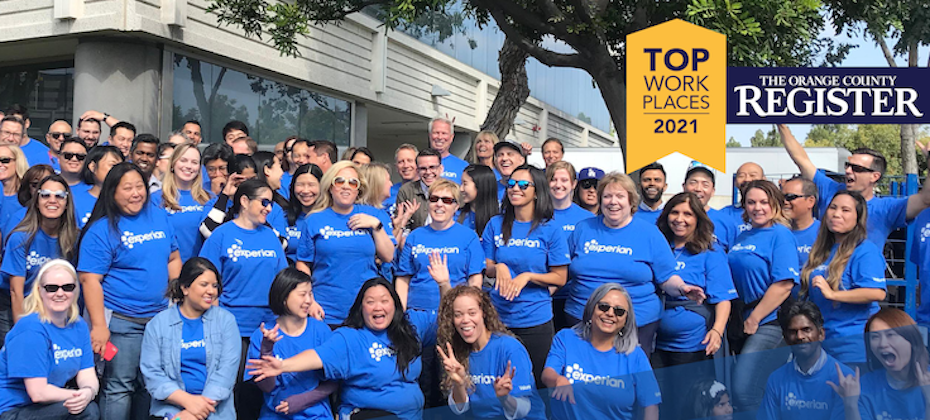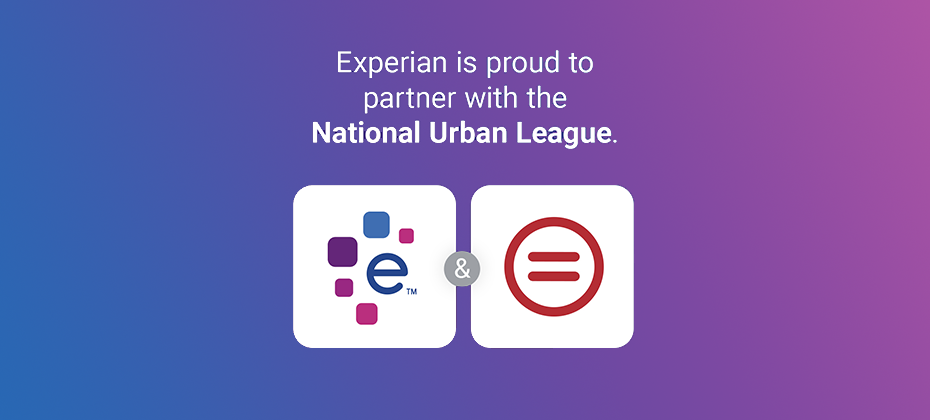Social Responsibility
Experian is deeply committed to making an important difference in each of the communities we operate and live all over the world. Through our relationships with nonprofit organizations, our dedication to consumer education and our encouragement of employee volunteerism, we are able to champion a number of important causes. Read about our latest corporate social responsibility news below:

For the ninth year, the Orange County Register has named Experian North America as a Top Workplace, securing the #1 ranking for the second consecutive year. The award, which is based on employee feedback in a survey of hundreds of leading companies in Orange County, recognizes our company’s culture of inclusion, and our commitment to employees and communities. Orange County is the home of our North America operations, and we are especially honored to be recognized again for our inclusive work environment and achieving higher performance while giving back. This honor demonstrates the talent and compassion of all the people who work at Experian. Thank You All our decisions are driven by our desire to ensure our employees feel valued and protected. As part of this, we issued a ‘Thank You’ Share Award to all employees at the beginning of this year to recognize perseverance through the pandemic, giving thousands of employees an equity stake in the company. Coming Together Our Employee Resource Groups (ERGs) continue to grow and support employees in different ways, which include activities that bring employees together internally to serve their communities externally. For example, our Asian American ERG worked closely with Pan-Asian leadership organization Ascend to support the Asian American community and employees, considering increasing discrimination and xenophobia during the pandemic. Together they kicked off Feed Your Hospital, which facilitated the delivery of meals to frontline COVID-19 healthcare workers by supporting local Asian restaurants. Meals were purchased at the restaurants and delivered to participating hospitals. The campaign raised funds for hospitals in Orange County. Social Good This year, we also awarded two OC-based organizations with major grants – the OC Hispanic Chamber of Commerce and TGR Foundation (a Tiger Woods Charity). For the OC Hispanic Chamber of Commerce, we funded and facilitated credit education initiatives for the Youth Chamber Program – funds went towards scholarship awards and event costs. We also added credit education to the ‘Pre-Venture Business Program’ curriculum – with funds going into marketing, training, one-on-one consulting, and event costs offered in both Spanish and English. For the TGR Foundation grant, we are working on ongoing projects with the foundation to support credit education, small business entrepreneurship, homeownership, and financial inclusion efforts. In total, employees volunteered more than 900 hours to Orange County-based nonprofits and Experian matched funds to those organizations that employees volunteered with and donated to. Our employees continue to help people who are facing unprecedented and unforeseen challenges. Different groups and employees of all levels are working together to help our clients, customers and communities persevere. We are honored that the Orange County Register continues to recognize our tireless efforts to make a difference in the communities in which we live and work.

The United Nations identifies removing poverty as one of its 17 Sustainable Development Goals. There’s a reason it’s number one on their list: Access to affordable financial services opens the door to opportunities for people to transform their lives – from homes and healthcare to education and entrepreneurship.. At Experian, our focus is on increasing access to financial services, improving financial literacy and building consumer confidence; we help people take control of their financial health. We are using the power of data innovation to transform lives and help businesses grow, improving financial health for people around the world. We created a dedicated Social Innovation Programme to fund, build and recognize products that will have a positive impact on the financial health of consumers. Between 2013 and April 2021 we have invested over US$8m across 29 product ideas. Eighteen of those products have launched, reaching 61 million people, many of whom are from financially vulnerable backgrounds. In June, we opened applications for our latest round of annual Social Innovation funding and asked teams to come up with new innovative products that positively impact the financial health of our consumers and use data for good. Of these, seven projects were shortlisted and presented to our Social Innovation Committee, which I am privileged enough to chair. It was a tough decision, but we chose three truly diverse projects to receive this year’s Social Innovation funding and we are really excited about what they could achieve. These projects will give millions of people in India access to a more positive loan decision, allow citizens in the UK to manage their vulnerability data across multiple organisations, and help farmers in Brazil to access the credit they need to keep their businesses going. Between them, these three projects alone have the potential to reach over 85 million people in the next five years, which is a truly exciting prospect. We are proud to celebrate our culture of purpose-led innovation. Our social innovation products have reached 61 million people since 2013 and we aim to reach 100 million by 2025. Read more about how we are helping to create a better tomorrow.

Growing up, my family rarely talked about money. So, in college, when I had the opportunity to get my first credit card, I also found myself in a little trouble when the first bill came. Most of us simply don’t learn about money matters until we find ourselves in these difficult situations. That’s one of the reasons why we’re excited to launch a creative and new program to teach young adults about the basics to building a financial legacy. “Protect The Bag” debuts today. It’s a six-part web series produced in partnership with Grammy-award winning artist, entrepreneur, author and community advocate, Lecrae. We first met Lecrae when he supported a United for Financial Health initiative in his hometown last year. “Protect The Bag” is a hip master class with finance and credit basics presented in an authentic way. Lecrae describes it as “edutainment” that includes scripted skits and interviews with everyday people. His friends Tyler Lockett, Coco Jones and WHATUPRG, among others, join him and share their financial health journeys as part of the shows as well. “Protect The Bag” is not just about credit. It’s about all aspects of personal finance. We’re proud of this innovative way to help consumers understand topics like saving, investing, budgeting and identity protection through someone they admire and trust. We hope you tune in every Tuesday, starting today, for the next six weeks. Episodes will appear on Lecrae’s YouTube channel starting at 7:00 p.m.EST/4 p.m.PST.

I am delighted to have announced our new partnership with Code First Girls, a non-profit organisation that teaches women to code for free, and helps increase the number of women – an under-represented group – working in tech. As a South African woman of Indian heritage, a single parent of two bi-racial girls aged 18 and 22, and a human resources executive with a passion for talent, leadership, and development, I work daily with my team to support Experian deliver on its brand promise of powering opportunities to create a better tomorrow for our people, consumers and businesses globally. So I am personally and professionally very proud of this development. Our partnership means four young women can study for a Code First Girls‘ Nanodegree, while working as paid interns in EMEA for the next nine months. These young talents come from diverse backgrounds, helping us diversify our workforce and bringing fresh thinking and new perspectives. They’ll benefit from our flexible ways of working, being based primarily from home. They’ll gain international experience as they are joining our Data Science and Innovation teams in South Africa and Italy. Moreover, they will help us drive our financial inclusion agenda by working on our United for Financial Health programme. This means we will have four young women working on financial inclusion solutions for women and four 18 to 25-year-olds working on financial inclusion solutions for the same demographic. This is a people-led innovation that contributes to the circular economy and adds purpose to our Company’s commitment to Diversity, Equity & Inclusion in its fullest sense, supporting our sustainable business goals. This isn’t philanthropy or theory. This partnership means our interns will work hard, learn and develop themselves as they prepare for a career in data and tech. It means we will also learn and evolve through this initiative. I’m curious: how do young, fresh talented people experience us? Will this partnership really enable four young women to start sustainable, fulfilling careers in tech, data, artificial intelligence, or software development? Will it help Experian attract and retain the best early tech talent in future? As with every innovative step we take, we’re unsure of the outcome, and that’s OK, as well as exciting. What is important is that we’ve started a new journey together, and I’m excited to see where it takes us. If you’d like to meet our EMEA interns and track their journey, follow us on Facebook, Instagram, LinkedIn and Twitter.

Over the last 19 months the pandemic has disproportionately impacted underserved and low-income communities and exacerbated the health and economic situations of millions of consumers, making it even harder to recover from financial hardships. We’ve made it our mission to change this, and we’re doing so by unlocking the power of data to facilitate access to fair and affordable credit and create new opportunities for people and businesses. We use our products, services, and time to make a real difference to the financial lives of people in many ways. This is at the heart of what we do as a company, and it’s one of the many reasons why it’s such a great honor to be named by Fortune to its global ranking of the top 50 companies making measurable progress addressing social problems. Experian Boost is one example of our commitment to improving financial inclusion, providing users access to credit as a result of improved credit scores. Two years ago, we created this first-of-its-kind service designed to help consumers instantly improve their credit score by giving them credit for on-time utility, telecom, and streaming service payments. Experian Boost in the USA and UK, combined with Serasa’s Score Turbo in Brazil, are empowering consumers to take more control of their financial well-being and promoting financial inclusion. United for Financial Health is another new financial recovery program we created to help consumers who don’t typically have access to credit. Through this initiative we teamed up with 11 NGOs to reach 35 million people in less than a year, smashing our first-year target of 15 million. The partnerships this year have focused on three primary consumer markets – the USA, the UK and Ireland and Brazil. That said, we recognize there is more work to be done. In our 2021 Sustainable Business Report, we made several commitments, including to reach 100 million people through our United for Financial Health campaign by 2024. We remain focused on using our business to make real, sustainable change. Being named on Fortune’s 2021 'Change the World' list is also a testament to our truly inclusive culture at Experian, where everyone’s hard work and commitment is proving to deliver a positive impact to society. Through our investments in data and advanced analytics, we will continue to help lenders identify consumers who are excluded from the credit ecosystem, but who can fulfill their financial obligations and pay responsibly. We want to empower consumers to take control of their financial lives, and we will continue to take strides to do so, ensuring we do the right thing for those we serve.

The largest Hispanic civil rights and advocacy organization in the U.S., UnidosUS, held its LatinX IncluXion Summit this week and I had the pleasure of participating as a featured speaker. One of the conference’s themes this year was “Reimagining our Future” and that resonated with me quite a bit. As an immigrant who has had to reimagine my life and career many times over, I shared some advice on how we can reinvent ourselves, become empowered by those opportunities and give back to our communities. Experian’s support of UnidosUS is especially meaningful to me. As co-executive sponsor of Juntos, our Hispanic and Latino employee resource group, I’m proud to be part of our partnership launch that extends beyond the conference. As part of our United for Financial Health initiative, Experian is supporting the organization’s Financial Empowerment Network (FEN) which provides free, financial coaching for Latino families. I have always been passionate about financial inclusion because I believe it helps empower people to be independent and take care of their families. This is especially true for immigrant communities that already must deal with the challenges of acclimating to a new country, culture, language, and more. Since joining Experian, I have been involved in initiatives that look to expand access for disenfranchised consumers, and a huge portion of my volunteerism has been devoted to educating this community about the benefits of intentionally managing their budgets and what are the best ways to gain access and handle credit. It’s not just UnidosUS affiliates and members who will benefit from our cross-cultural work. Our new Spanish-language consumer education e-book, credit education articles in Spanish, and the new monthly #ChatDeCrédito launched during Hispanic Heritage Month are available to all consumers. Having credit education resources available in-language is just one of many ways we can help those who have faced barriers to accessing credit and financial tools. We look forward to our partnership with UnidosUS and continuing to empower the Hispanic-Latino community.

The historic civil rights organization, the National Urban League, kicked off its first-ever virtual national convention recently, and Craig Boundy, former Chief Executive Officer of Experian North America had the honor of joining them. National Urban League President and CEO Marc Morial and Craig announced our new partnership that will support financial inclusion and credit education. During the announcement, Marc mentioned one of the key findings of the Urban League’s 2021 State of Black America – The New Normal: close to 17 percent of Black households lacked basic financial services, compared with three percent of white households in 2017, the last year for which FDIC statistics are available. He characterized this as a “disastrous and disproportionate impact of the COVID pandemic on the economic stability of African American communities.” We believe working together will make a big difference in the lives of underserved consumers. As part of our United for Financial Health program, Experian is providing National Urban League members access to credit education tools and services like consumer credit reports and Experian Boost™, as well as resources for small businesses. As Craig mentioned in his remarks, “at the heart of this partnership is knowledge: when you understand financial services, you come to understand the financial system. You can take steps to create and improve a relationship with financial service providers. That can make a huge difference today, and for future generations.” This partnership is just the start of our relationship with the National Urban League, and we look forward to working together towards closing the wealth gap and empowering consumers to achieve their life’s goals.

The summer months in Italy often provide us with a short time to take a break and recharge our batteries as we head into the second half of Experian’s financial year. Yet, there is still the opportunity to move important projects further forward. In July, Chief Operating Officer of Experian EMEA Marco Benvenuto announced we had agreed to partnerships with two non-profit organisations as part of our United for Financial Health programme. MircoLab and AMS both have goals that align with ours in working to reduce financial exclusion. Today, I can provide you with more details about our partnership and how we will help groups of people who find it hard to access fair and affordable credit because they lack relevant financial data. These credit “invisibles” can often come from vulnerable groups such as NEETs (Not in Employment, Education or Training), foreign caregivers and female victims of violence. The Covid-19 pandemic has been a challenge for us all, not least the people in these groups. Working with our partners, the IncludiMi initiative aims to create a new credit assessment based on data that can contribute to a more inclusive measure once analysed. We will also strengthen the skills of the people involved by offering financial education and mentoring them to become economically independent. At the heart of the new programme is the planned IncludiMi app, which will allow credit “invisibles”, including the unbanked, to have their financial health estimated by reviewing non-traditional data. People will use the app to create and understand their personal and family’s budgets while following tips and suggestions from the financial education sessions led by experts at our partners. We are excited about the potential this partnership - and the United for Financial Health programme overall - has to improve the lives of so many people by tackling financial exclusion. I look forward to providing you with further updates on our progress in the coming months.

There are times in most of our lives where we can't get access to the financial system in a way that we want. Be it for a mortgage, a car, or a business loan. We've all experienced the frustration when you feel you're on the outside of the system and you can’t do the things you want for yourself or your family. At Experian, it's our job to change that. We want to make sure everybody is included and has access to fair and affordable financial products. Financial inclusion is fundamental to our business. With our focus on increasing access to financial services, improving financial literacy and confidence, and helping people manage their financial lives; we help power people and businesses to create their future. In fact, the United Nations includes access to financial services, such as credit and microfinance, among its Sustainable Development Goals. Access to affordable credit opens the door to opportunities for people to transform their lives – from homes and healthcare to education and entrepreneurship. This has never been more important than it is today. Creating a Campaign to Drive Financial Health Worldwide As the pandemic took hold in 2020, we stepped in with data and analytics to support governments, health services and national emergency response efforts through major initiatives such as COVID Radar in Brazil and Experian CORE (COVID Outlook & Response Evaluator). These are just two examples of how we can use our data and expertise to make the biggest difference to society. It soon became clear that the impact — not just on physical health, but on financial health — would be far-reaching for people around the world. We looked at how we could use our expertise and resources to help vulnerable communities through the crisis and focused on financial education as the best way to strengthen their resilience and support their road to recovery. We launched our United for Financial Health programme. We rapidly established 11 NGO partnerships across our biggest consumer markets to deliver targeted financial education for some of the communities hit hardest by COVID-19. By the end of the year, we had reached nearly 35 million people, more than double our original goal of 15 million, and we’re not stopping there. We aim to reach 100 million people by 2024. Part of our efforts include our member relationships around the world. This year, we surpassed the milestone of 100 million direct relationships with consumers globally and delivered further innovations to support people through our business, with the launch of products like Experian Boost in the UK and Serasa Score Turbo in Brazil. This, of course, is on top of our ground-breaking Experian Boost launch in the United States in 2019. Our goal is to have a direct relationship with as many people as possible; to truly become the Consumers’ Credit Bureau and power financial opportunities for all. Driving Innovation with Social Purpose Our culture of innovation helps us harness opportunities to drive business growth. We are continually investing in product innovation and new sources of data to address emerging market opportunities that can make a real difference to global communities. In 2020, around 1,000 “innovators” from across Experian joined our annual Future of Information Conference, which was held virtually because of the pandemic, to encourage them to think differently in their work. Topics included fairness in artificial intelligence, transforming agribusiness and enhancing the consumer healthcare experience. Teams at our DataLabs in Brazil, Singapore, the UK and the USA tap into our culture of innovation to continually create new solutions to global challenges. The result of all this is that our Social Innovation products have now reached 61 million people since 2013. We aim to reach 100 million by 2025. As John Hope Bryant, CEO of one of our NGO partners Operation HOPE, says, “Experian’s commitment to unlocking the power of data to create opportunity means more people will be set up not just to survive, but to thrive in the months and years to come.” In this year’s Sustainable Business Report our commitments come through stronger than ever. We are raising our ambition and aiming to reach 100 million people through our social innovation products by 2025. Our goal is to reach 100 million people through our United for Financial Health campaign by 2024. We have also pledged to protect our planet by becoming carbon neutral in our own operations by 2030. We know we’ve got more work to do and we remain focused on using our business to make real and sustainable change. With social innovation running so deeply through the core of our culture, and our commitment to improving global financial health front and centre of our thinking, we will continue to push to find new solutions to help people, serve communities and protect the environment, helping to create a better future for all. All of this is very personal to me. I passionately believe we can and should drive to make a difference in society. I serve as executive sponsor of our ESG programs and this isn’t just another corporate program, it’s at the heart of what we do as a company to power financial opportunities. My personal pledge is to continue to keep you updated, as we progress our agenda to sustainable environmental and societal change. Read the full SBR report here.